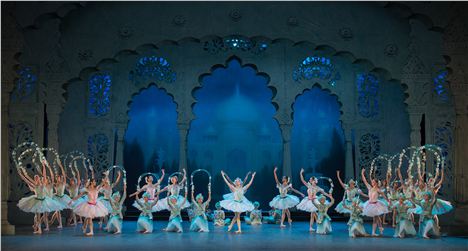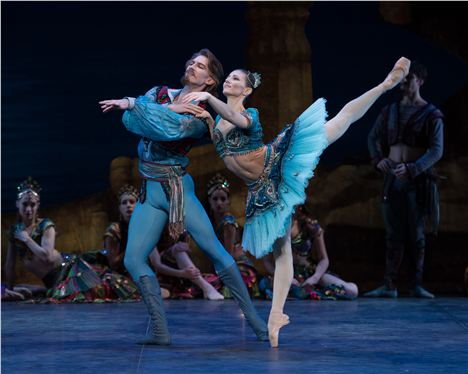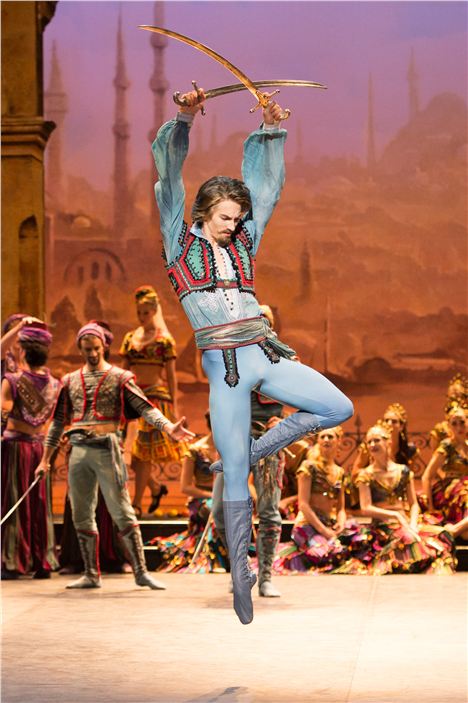ENGLISH National Ballet bring their revival of the classical ballet Le Corsaire to The Palace Theatre. For plenty of good reasons, not least some superb choreography which ensures its place in ballet galas.
It’s being presented as a great starting point for audiences unfamiliar with the art form. So does it live up to the promise?
This is a well-paced production, with plenty to see and enjoy. In many ways, it is an ideal place to experiment with ballet. Yet, there’s something missing.
The story isn’t strong, with as many twists and turns as a wedding day in a TV soap it can be difficult to follow.
Hero pirate Conrad is in love with Medora, ward of the slave trader Lankendem. As the trader busies himself selling girls to the local governor, the Pasha, Conrad frees Medora, only to see the Pasha discover her beauty and insist on purchasing her before Conrad can free her again. That’s just the first act.
Over the next two acts there are yet more twists and turns, fast-moving sword fights, drug-induced dreams and a dramatic shipwreck that allows the two lovers to be together in eternity. The ballet is adapted very loosely from Byron’s poem The Corsaire, which may explain the hallucination scene, but it fails to engage with Byron’s more modern ideas.
But a silly story isn’t enough to sink a ballet, and this ballet has much to commend it. The dancing is engaging, with highlights dotted throughout, as well as concentrated in the well-known demands of the gala-esque second act.
Lead Principal Daria Klimentová as Medora may be less experienced than some in the role, but her mix of speed, stillness and her ability to contrast control with the near-abandonment developed through love, gave life to her portrayal.
Athletic Lead Principal Vadim Muntagirov was a strong Conrad, with particularly impressive leaps in the final act. His love for Medora was the love of a powerful man who is going to get what he wants rather than the love of a man enthralled, which might have been a little more Byronic.
Of the other three male soloists, Brazilian Junor Souza stood out as Ali, Conrad’s ‘devoted’ slave. This ballet is particularly noted for the impressive roles given to its male dancers. The women work hard too. Laurretta Summerscales as Gulnare, a spirited slave of the harem, was also excellent, providing an element of contrast to the role of Medora. The corps de ballet work in the opium dream scene is impressive, yet effortless.
Visually the production is superb.
Sets and costumes have been designed by Bob Ringwood (Batman, Troy and Alien 3). Basing his designs on mid-nineteenth century art works, he creates the feel of the Romantic period in which the ballet was first staged. The costumes, bright and traditional, help identify the characters and add to the visual feast. The staging of the ship which opens and closes the show is wonderfully executed.
This is a well-paced production, with plenty to see and enjoy. In many ways, it is an ideal place to experiment with ballet. Yet, there’s something missing.
Firstly, it’s the music. This version has music from nine composers. Swan Lake, I believe has one: Tchaikovsky. Sleeping Beauty also one: Tchaikovsky. Romeo and Juliet one too: Prokofiev. Le Corsaire, with its nine composers, fails to envelope the audience in the music. There’s no great thematic sweep and, if you’re new to ballet, very little to recognise, even if you only recognise ballet music from Disney or The Apprentice.
Then there’s the story. While plenty of ballets have some unbelievable ideas, such as conversing with swans, they do manage to sweep you along because the stories are allegorical, they represent emotions and ideas which are universal.
Le Corsaire starts with, and returns to, a few men capturing and trading in women for sex. Twenty years ago we could watch this as something distant. It wasn’t here and it wasn’t of our time, or so we thought.
Now we know differently, so the audience needs to suspend more than disbelief in order to buy in emotionally to what’s meant to be a love story. I’m not sure how you would explain the plot to children. And directing the powerful Pasha to be played like some rich oriental version of Benny Hill doesn’t help.
Artistic Director Tamara Rojo said: “This is a ballet with four male principal roles. Unlike many of the classics it will give great opportunities to the men in the Company to show off their skills and athleticism."
Thus, I was particularly disappointed to see Yonah Acosta, nephew of Carlos, sat in the audience rather than on stage. He will appear in later productions, as will many others from the massive pool of international dancers at the disposal of the English National Ballet (check their website before booking if you want to see a particular performer).
Although it lacks real heart, Le Corsaire is still a great opportunity to see some remarkable dancing and breathtaking visuals. An adequate introduction to the delights of ballet.
English National Ballet’s production of Le Corsaire is at The Palace Theatre from Monday 11 to Saturday 15 February.
Follow Joan on twitter @joand7
















